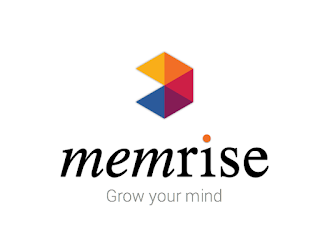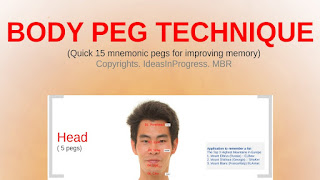Jak a čím posílit paměť
Jak se učit?
Memory - Paměť
1)
Paměť je nutné trénovat, cvičit ...
říká se tomu:
memory training techniques
Brain Athlet, Memo Athlet, Memory athlete ...
memory olympics techniques ...
2)
jak ale správně rozvíjet a cvičit paměť?
jak mohu trénovat paměť
Paměťové systémy / pomůcky ...
Zde máte inspiraci:
(kousek níže také česky)
Improve your memory, Peg System
Memory Champion Teaches You How to Memorize Anything
Remember What You Read - How To Memorize What You Read!
How To Study Better - Best Study Techniques - YouTube
The Most Powerful Way to Remember What You Study
Memory Systems: Image-Based Techniques for Memorizing Almost Anything
How To Learn Anything 10x Faster
The Most Powerful Way to Remember What You Study
Faster than a calculator | Arthur Benjamin | TEDxOxford
25th World Memory Championship 2016
Alexander vs. Nelson - USA Memory Championship 2014
Memory olympics Youtube
Mental Athletes: The Sport of Memory - Full Nelson
The Simple Trick to Become a Memory GENIUS!

Brain: Memory In Brain Full Documentary 2016 (720p) HD
Show Jana Krause 20. 5. 2011 - 3. Jakub Pok - paměť zapamatování
Jakub Pok
lektor, zakladatel Školy paměti
Lektor a zakladatel Školy paměti Jakub Pok je absolventem Institutu mezinárodních studií Fakulty sociálních věd a Fakulty humanitních studií Univerzity Karlovy. Kromě mezinárodních a humanitních studií úspěšně zakončil studia práv. Technikami na zlepšování paměti se zabývá více než čtrnáct let. Účastnil se několika paměťových soutěží včetně Prague Open Memory Cup 2003.
„O paměťových technikách jsem se dozvěděl z německé literatury při svém studiu na gymnáziu v Berlíně. Později, s přibývajícími informacemi, ve mně zájem o paměťové techniky stále sílil. Během půlročního tréninku jsem dosáhl překvapujících výsledků a přiblížil se v některých disciplínách k českému národnímu rekordu na paměťové olympiádě. Zapamatoval jsem si 52 kanastových karet v přesném pořadí do 2 minut, ale zajímalo mě hlavně praktické použití technik. Poté jsem paměťové techniky začal využívat u zkoušek na vysoké škole, při studiu jazyků a vymýšlel jsem různé hry plné fantazie k tréninku paměti. Velmi zábavné, doporučuji! Řadu let jsem využíval naučených technik také při výuce cizích jazyků ve školách a ve firmách.Paměťové techniky jsou velmi dobře pochopitelné a fungují u každého bez rozdílu věku. Chce to jen být otevřený novým metodám, nikdo nás totiž nikdy neučil, jak se máme správně učit. Pochybnosti rychle mizí a lidé odcházejí ze školení nadšeni. Když se pak pravidelně věnují krátkému tréninku, výsledky jsou ohromující!"
Jakub Pok,
zakladatel a lektor Školy paměti
Ed Cooke - memory techniques
The Alphabet Peg Method to improve Memory
List of 15 Body Pegs:
HEAD
---------
1. Forehead (first)
2. Eyes
3. Nose (middle)
4. Lips
5. Chin (last)
UPPER BODY
---------------------
6. Neck (first)
7. Shoulders
8. Chest (middle)
9. Belly
10. Waist (last)
LOWER BODY
----------------------
11. Hips (first)
12. Thighs
13. Knees (middle)
14. Calves
15. Feet (last)
Kinds of Mnemonics
Advantages and Disadvantages of Using Mnemonics
type of memory
https://cz.pinterest.com/search/pins/?q=type%20of%20memory
NYT bestselling author and human guinea pig Tim Ferriss comes back on the show to tell the wild stories of his new TV show and how we can all be superhuman...
Tim Ferriss and The 4-Hour Workweek
https://twitter.com/tferriss
Tim Ferriss's Top 10 Rules For Success (@tferriss)
- Have other interests
- Scratch your own itch
- Learn the art of the pitch
- Focus on your strengths
- Be able to sell
- Ideas are worth nothing
- Pick the right things to do
- Be pragmatically pessimistic
- Have a focused metric
- Use failure to help you
1- Have other interests.
Be proactive in all aspects of your life, not just in business. In order to find true success in life, you need to have balance. This means investing time in your relationships, your social networks and time for yourself. Meditation, sports, cooking, whatever it is, there needs to be more to your life than just “work”
2- Scratch you own itch.
Trying to be all things to all people is a fast track to nowhere. Spend your time, energy, and indeed your money, on things that matter to YOU. Doing otherwise will not bring you success or happiness!
3- Learn the art of the pitch.
It is not only important to learn how to pitch, but also when to pitch. Opportunities for huge exposure are seldom, so be prepared.
4- Focus on your strengths.
We all have our strengths, and our weaknesses. Being honest with yourself and knowing what they are will play a great role in your success. Refine and build upon your strengths, and delegate out tasks that are not your strong points.
5- Be able to sell.
Everyone in the business world sells in one way or another. It is imperative that you learn how to communicate well in order to sell what it is you are offering. Take note of the things you buy, and understand why you bought them. You can then use this as a tactic to understand your target market and how to deliver yourself to them well.
6- Ideas are worth nothing.
Executing your ideas is everything. Don’t start a business if you aren’t willing to get wildly uncomfortable on the journey to making it work. Anyone can come up with an idea. The real test lies in what you are willing to DO to create something of value in the world.
7- Pick the right things to do.
Similar to knowing your strengths, you must be able to pick and choose wisely what gets your attention, and what doesn’t. Focusing on one or two key tasks at a time makes you efficient and effective. Both of which are essential for success.
8- Be pragmatically pessimistic.
Optimism is important, especially if you are choosing to step up and back your ideas. But as a start up or a beginner in business, it is as important to know intimately in your mind all the ways in which things may not work, and be prepared for them.
9- Have a focused metric.
Data doesn’t lie. When you are starting out in business, it’s important to quickly identify what is measurable. Then you can identify your strengths and build on them.
10- Use failure to help you.
Tim’s book ‘The 4 Hour Work Week’ was rejected by 26 of 27 potential publishers. It ended up spending 4 years on the New York Times bestseller list. You WILL face failure. Where you go from those failures will determine your future. Don’t let a knock back knock you down.
source: Tim Ferriss Top 10 Rules For Success & Inspiring Quotes
Tricks for Combatting Procrastination | Tim Ferriss
Tim Ferriss' 4-Hour Body #MentorMeTim
13 komnata Martina Dejdara
Anti-Snob
anti- + snob. Adjective[edit]. antisnob (comparative more antisnob, superlative most antisnob). Opposing snobbery. Noun[edit]. antisnob (plural antisnobs)
Memory
Study
Učení
Skills






Žádné komentáře:
Okomentovat